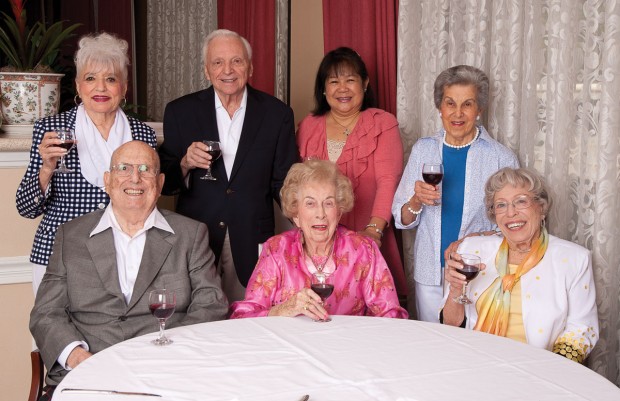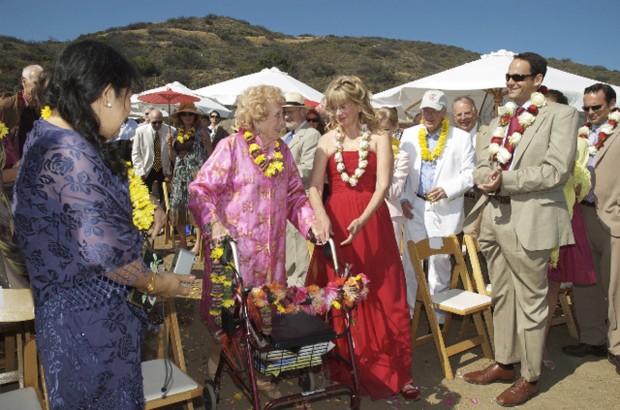Mom's Place

The writer's mom, Babe Giese (sitting, in middle), enjoys a nightcap with friends (top row, from left) Blanche Abramson, Milton "Mitty" Tartakov, Elma Colindres, Flo Selber, (front, from left) Hymie Abramson and Geneva Carter. (Photo: www.lawellphoto.com)
When I was young, maybe seven or eight, my girls’ club made terrycloth covers, with dog faces, that fit over bars of Ivory soap. When we distributed them to a nursing home, the residents’ naked neediness as they reached out for their silly hand-made gifts – their scrawny outstretched arms demanding that their little visitors enter their rooms and stay awhile – haunted me for the next five decades.
My ensuing aversion – dare I call it what it was? repulsion – to the elderly was ironic because as a child I’d shared a bedroom with my grandmother, the person after whom I was named – Josephine, Jo – and the person I loved best. But my grandmother wasn’t “old;” she existed in a category unto herself. She was my best friend who let me sit in her lap as long as I wanted, and hold her hands that smelled of butter and flour – she was a professional bread baker – as long as I needed.
On a recent trip to visit my 95-year-old mother, Mom invited me to stay at her place. Her place is a two-bedroom, independent-living apartment in a Houston high rise for seniors.
“It’ll be easier,” she said.
Easier for whom? I thought.
Although my sister had decorated Mom’s new apartment in cheerful yellows, and I was looking forward to meeting her new friends, I had dry-throat anticipatory anxiety about spending three nights in a 16-story building filled with nothing but old people. I tried to calm myself down by saying, Anyone can do anything for three nights.
I arrived in time for dinner. The tables were set with white cloths and fresh arrangements of hydrangeas and roses. At Mom’s table were Geneva, Blanche and Hymie, who had lived in the apartments for two years, Mom and Elma (her caregiver), and Mitty, who had just arrived two weeks ago after his wife died four months earlier.
Blanche, who was on my right, was 81. Her silver hair was twisted up in a beehive, and she wore large, elegant, gold-hoop earrings. She explained that Hymie, her husband, and Mitty, who were sitting next to each other on the other side of the round table, were born on the same day in the same hospital 87 years ago. They’d grown up together, served in the Navy in WWII together, and were still best friends.
Blanche ordered the Healthy Choice dinner, and, referring to her husband of 58 years, she said to the waiter, “He’ll have the same.” Except when the waiter got to Hymie, he ordered exactly what he pleased. As a new wife of barely two years, I was amused by the universal ineffectiveness of wifely dietary interventions. I made a mental note not to waste my breath commenting on my husband’s red meat-vodka-ice cream habit.
The woman on my left, Geneva, asked me to read the menu to her. “I can’t see,” she said.
Oh, so this was the person Mom had told me about. Mom, who’s self-conscious that she’s hard-of-hearing, had said to Geneva, “I’m sorry, but I don’t hear well.” “And I can’t see!” said Geneva. “So we’ll be good friends.”
Geneva, 92, explained to me that until recently she’d served on the Welcoming Committee, where it was her job to show the new people around. “It made me feel that I still had something of value to offer,” she said. She also explained that it ended up interfering with her life too much because each time a new person arrived she had to drop everything.
Across the table Mitty was saying that his late wife was a shopaholic. When she died she had something like 150 St. John suits in her closet. “She was sick. She had a disease.” He paused. “But what a woman she was!” This widower, who was still wearing his gold wedding band, said this in a juicy way, relishing the part of his married life that had nothing to do with designer suits.
My sister had said that Mitty had arrived at The Hampton almost mute. This evening he was dressed in a cheerful turquoise Lacoste golf shirt. Clearly his muteness was melting.
Contrary to my expectations, not once did anyone at the table complain about their maladies. Whatever they were suffering from was not what they were dining out on.
After dinner, after we rode the elevator up to Mom’s apartment on the 14th floor, and after she switched on her gas fireplace for extra heat, even though it was a sweltering 100 degrees outside, she said, “I met that group the first night at dinner. What a break that was!”
She’d also told me about a time during the first week when she’d been in the pub at happy hour, sipping one of her two Scotch and sodas (no ice.) She mentioned that her doctor had said she’d sleep better and need fewer sleeping pills if she stopped the Scotch and soda. One of the residents said, “Change doctors! When you get to be 95, I think you can do what you please!”
Mother loved telling me that story, and I loved hearing it. In the five years Mother had lived at my sister’s gorgeous home, my sister and her husband had provided Mom with everything – except a group of peers to kibitz and laugh and complain with.
When you’re lucky, sometimes, life can begin again at 95.
A friend, whose aunt also lives in a senior community, said the atmosphere reminds her of a cruise ship. My brother and his new bride, who often take Mom and her new friends to the family’s favorite Vietnamese restaurant, say her place reminds them of a college dorm. Since Mom had never gone to college – her first (and only) job, immediately after high school, had been doing telephone catalog sales for Sears – maybe this was her chance to finally experience the fun of living in a dorm.
Mom, who had originally resisted the move, protesting that she did not want to live among strangers, was blossoming, thriving in this new, social environment.
Another friend’s mom recently moved to a group home. Although this private home, with only six residents, is much smaller and homier than Mom’s, the friendliness and increased sociability has been good for his mother too.
The next day I was down in the rehab area riding the bike (I’d just had knee surgery) when a parade of residents started creeping in on their walkers and wheelchairs.
Uh oh. It was just this sort of scene with all this almost-end-of-life medical paraphernalia that I’d dreaded. I knew it would be depressing. Instead, as I kept pedaling, I was impressed how everyone was still trying to be the best they could be.
During my visit, a Dutch friend phoned Mom, and I couldn’t help but think of the friend’s Papa, who lived to be almost 98. The Dutch have a home-health policy that encourages the elderly to stay in their own homes. For something like a mere 100 euros a month extra, Papa had people checking in on him four times a day, including a visit at midnight.
I’d always thought that was the best: Stay in your own home, in your own bed, until the end. Now I wonder if Papa, a retired naval architect, who was sociable and charming, wouldn’t have enjoyed his later years more if he’d lived in a senior community like Mom’s.
The last morning I was walking Mother’s Chihuahua-mutt mix across the street at the park with the 64-foot-tall cascading waterwall designed by Philip Johnson. Flo, who plays Scrabble with Mom, was strolling with Carl, her 95-year-old walking partner. Flo stopped and gave me a cozy hug and a kiss, and I thought, This is only my third day here, and I’m getting kissed and hugged on my morning walk. I like it. My husband and I had recently moved, and on our walks none of our new neighbors, except for our landlady, have hugged and kissed us. Is it that folks at this age, at this stage, don’t see any value in holding anything back? They are living in the now, the now now, the extreme now.
My husband and I, both in our mid-60s, are remodeling our two-story home, and we decided, reluctantly, to install an elevator, just in case. I told him on the phone, “If we live to be 95, we’d be lucky to live in a place like Mom’s.”
The last time I was down in the rehab room, a woman, who was on oxygen, zipped in on a motorized scooter. Riding the bike next to me, she said, “So, you’re new here?”
Editor’s Note: Jo Giese’s first job as a journalist was for the Houston Post. She has been a special correspondent for Marketplace, public radio’s daily business show, and a contributor to, among others, This American Life and The New York Times. When she is not visiting her Mom at The Hampton at Post Oak, she lives in Southern California.
Want more buzz like this? Sign up for our Morning Buzz emails.
To leave a comment, please log in or create an account with The Buzz Magazines, Disqus, Facebook, or Twitter. Or you may post as a guest.



